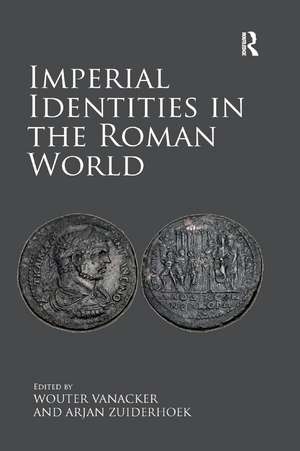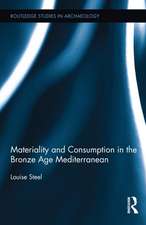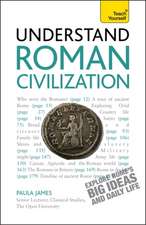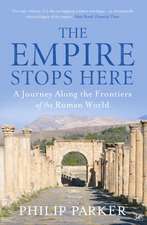Imperial Identities in the Roman World
Editat de Wouter Vanacker, Arjan Zuiderhoeken Limba Engleză Paperback – 30 iun 2020
| Toate formatele și edițiile | Preț | Express |
|---|---|---|
| Paperback (1) | 260.45 lei 6-8 săpt. | |
| Taylor & Francis – 30 iun 2020 | 260.45 lei 6-8 săpt. | |
| Hardback (1) | 850.19 lei 6-8 săpt. | |
| Taylor & Francis – 14 dec 2016 | 850.19 lei 6-8 săpt. |
Preț: 260.45 lei
Preț vechi: 326.74 lei
-20% Nou
Puncte Express: 391
Preț estimativ în valută:
49.84€ • 54.12$ • 41.87£
49.84€ • 54.12$ • 41.87£
Carte tipărită la comandă
Livrare economică 23 aprilie-07 mai
Preluare comenzi: 021 569.72.76
Specificații
ISBN-13: 9780367879709
ISBN-10: 0367879700
Pagini: 244
Dimensiuni: 156 x 234 mm
Greutate: 0.48 kg
Ediția:1
Editura: Taylor & Francis
Colecția Routledge
Locul publicării:Oxford, United Kingdom
ISBN-10: 0367879700
Pagini: 244
Dimensiuni: 156 x 234 mm
Greutate: 0.48 kg
Ediția:1
Editura: Taylor & Francis
Colecția Routledge
Locul publicării:Oxford, United Kingdom
Cuprins
Introduction: Imperial identities in the Roman world, Zuiderhoek and Vanacker /1. Between Greece and Rome: Forging a primordial identity for an imperial aristocracy, Hartmann / 2. Rituals of killing: Public punishment, munera and the dissemination of Roman values and ideology in the imperium Romanum, Hahn / 3. The war cry: Ritualized behaviour and Roman identity in ancient warfare, 200 BCE – 400 CE, Whately / 4. Uniting the army: The use of rituals commemorating Germanicus to create an imperial identity, McIntyre / 5. Joining the Empire: The imperial cult as a marker of a shared imperial identity, Madsen / 6. Promoting family, creating identity: Septimius Severus and the imperial family in the rituals of the ludi saeculares, Rantala / 7. Constructing a religious landscape: Terminalia, Fortuna Muliebris and the Augustan ager romanus, Beltrão da Rosa / 8. The monument of Roma and Augustus on the Athenian Acropolis: Imperial identities and local traditions, Morales / 9. Herodes Atticus, Memnon of Ethiopia and the Athenian ephebeia, Allen / 10. Roman influence on rituals of identification in Egypt, Depauw / 11. The imperial identity of senatorial rituals in Late Antiquity, Frenkel / Index.
Notă biografică
Wouter Vanacker is a Postdoctoral Research Fellow at the Department of History of Ghent University. His doctoral thesis focused on patterns of economic and political interaction between nomadic and sedentary communities in North Africa in the context of the Roman Empire. Currently, he studies long-term urbanisation trajectories in Africa during the imperial period.
Arjan Zuiderhoek is Associate Professor of Ancient History at the Department of History of Ghent University. He is author of The Politics of Munificence in the Roman Empire: Citizens, Elites and Benefactors in Asia Minor (2009) and The Ancient City (2016). Alongside Paul Erdkamp and Koenraad Verboven, he is also editor of Ownership and Exploitation of Land and Natural Resources in the Roman World (2015).
Arjan Zuiderhoek is Associate Professor of Ancient History at the Department of History of Ghent University. He is author of The Politics of Munificence in the Roman Empire: Citizens, Elites and Benefactors in Asia Minor (2009) and The Ancient City (2016). Alongside Paul Erdkamp and Koenraad Verboven, he is also editor of Ownership and Exploitation of Land and Natural Resources in the Roman World (2015).
Recenzii
"Overall the book strikes a good balance between focus and methodological approach, incorporating material, digital, and textual techniques, and moving between the early and high empire, and from Rome to the provinces ... The volume will be a nice resource for those interested in a variety of approaches to the topic, and to see how a sense of belonging to the cultural, religious, social, or political world of Rome was manifested in different areas and in different times."
- Robyn L. Le Blanc, The University of North Carolina at Greensboro, USA, Bryn Mawr Classical Review 2019
- Robyn L. Le Blanc, The University of North Carolina at Greensboro, USA, Bryn Mawr Classical Review 2019
Descriere
This volume, rather than concentrating on politics and imperial administration, studies the manifold ways in which people were ritually engaged in producing, consuming, organising and worshipping that fitted the changing realities of empire, focusing on how individuals and groups tried to do things 'the right way', the Greco-Roman imperial way.













